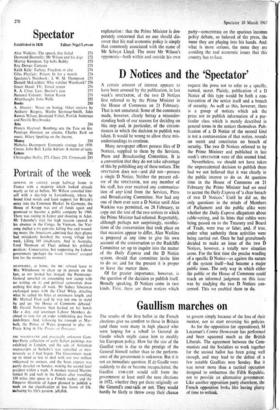Gaullism marches on
The results of the first ballot in the French elections give no comfort to those in Britain (and there were many in high places) who were hoping for a rebuff to General de Gaulle which might cause him to modify his European policy. How far the size of the Gaullist vote is due to the prestige of the General himself rather than to the perform- ance of the government is unknown. But it is not an immediate question. If de Gaulle were suddenly to die or become incapacitated, the Gaullist • UNR-UDT would still form the government at least until the next elections in 1972. whether they got there originally on the General's coat-tails or not. They would hardly be likely to throw away their chance to govern simply because of the loss of their mentor, nor to start reversing his policies.
As for the opposition (or oppositions). M Lecanuet's Centre Democrate has performed and been squeezed much as the British Liberals. The agreement between the Com- munists and the Socialists to work together for the second ballot has been going well enough, and may lead to the defeat of a few notable Gaullists next Sunday. But it was never more than a tactical operation designed to embarrass the Fifth Republic, not to provide an alternative government. Like another opposition party elsewhere, the French opposition looks like having plenty of time to rethink.






























 Previous page
Previous page